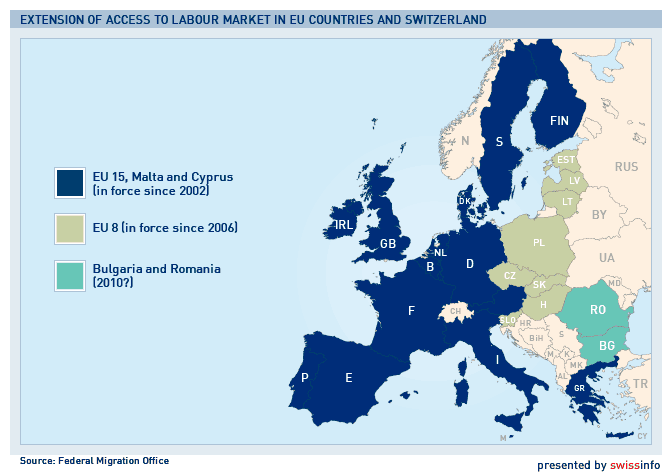
Press give voters credit on EU labour vote

Even clearer than Sunday's approval by Swiss voters of a key labour accord with the European Union was the positive mood in the Swiss press the day after.
Nearly 60 per cent of voters supported the continuation of the free movement of people treaty as well as extending it to the EU’s newest members, Romania and Bulgaria.
“The people are more predictable when it comes to taking decisions on important business than sceptics of direct democracy give them credit,” said the Neue Zürcher Zeitung in its commentary.
“Even in these economically adverse times the Swiss have spoken out in favour of the continuation of the free movement of people accord with its largest trading partner.
“They proved that they can differentiate between the short-term economic crisis and the long-term relationship with the EU… Switzerland’s European policy has been legitimised by the people like in no other EU country.”
The Bern-based Bund continued on the same track: “The Swiss showed that they have an unflinching feel for the economic interdependence of our country with the EU. The economic crisis requires that one does not bury one’s head in the sand but sharpens the focus on the vital importance of open markets for our small country including the free exchange of labour.
It added: “The result is spectacular – and it would be fascinating to see whether any other country in Europe would vote for an opening of the labour market in such trying times.”
Benefits
The Basler Zeitung asked why the Swiss were now showing more support for the accord than they did in a similar vote four years ago. The newspaper then proceeded to answer its own question.
“The Swiss obviously recognise – despite complaints about waves of German immigrants and cases of wage dumping – the good results stemming from the accord: they recognise the benefits for hospitals as well as the restaurant and hotel industry and other branches of the economy.”
Le Temps in Geneva said the vote made evident that “a majority recognises the importance and closeness of relations between Switzerland and the EU”.
It said: “Voters affirmed that this is a convenient solution for the economy while providing them with functional benefits, such as making it easier to work, travel or go to school abroad, to pass through customs and other aspects of daily life.”
The Tribune de Genève was also of the opinion that voters chose “the bilateral path as the best way forward in our relationship with Europe”, but warned that despite the positive outcome, “EU membership has not moved an inch closer”.
Fear of foreigners?
The tabloid Blick said “a considerable majority of Swiss have shown they are not afraid of poor foreigners who, according to the [vote opponents’] propaganda campaign, are lurking on our borders to peck our social security system empty”.
The vote was closely followed in neighbouring countries, Germany and Austria.
On its website, Germany’s Spiegel published a commentary under the title, “The good Europeans”.
The magazine said the Swiss had proven themselves to be reliable Europeans despite their image as isolationists. But Spiegel added that the size of the yes vote did not mean the Swiss would want to join the EU anytime soon. The Swiss want to go their own way in Europe, it said.
The Standard in the Austrian capital, Vienna, said the yes vote could give impetus to the EU membership drive by the Social Democrats and Greens, while Italy’s Corriere della Sera reported on the “defeat of the isolationists”.
swissinfo, Dale Bechtel
Switzerland is not a member of the EU but it has concluded 20 major bilateral agreements with the 27-nation bloc.
There are also about 100 secondary bilateral accords between Bern and Brussels.
Negotiations are underway for a bilateral treaty aimed at regulating access to cross-border electricity and a free trade accord on agriculture.
In 1992 voters rejected a plan to join the European Economic Area (EEA), a halfway house to full EU membership.
The free movement of people is just one of several bilateral accords with the European Union and is designed to facilitate trade between the Confederation and the EU, Switzerland’s largest trading partner.
While pollsters had predicted a tight race, the results on Sunday showed that voters in German- and French-speaking Switzerland clearly supported the issue. The Italian-speaking canton of Ticino in southern Switzerland was clear in rejecting it.
Voters there have traditionally been sceptical towards closer relations with the EU and have rejected European issues in the past, including the Economic Area Treaty with the EU in 1992. Experts note that the Ticino labour market is one of the Swiss regions most exposed to international competition and pressure on salaries. Nearly 45 per cent of the workforce there are foreigners.
A former Bulgarian ambassador to Brussels and Bern, Lea Cohen, said that a no vote would have been “Switzerland’s loss” and that most Bulgarians prefer Spain and Britain to Switzerland. She estimated there are about 1,000 Bulgarians currently in the country.



In compliance with the JTI standards
More: SWI swissinfo.ch certified by the Journalism Trust Initiative































You can find an overview of ongoing debates with our journalists here . Please join us!
If you want to start a conversation about a topic raised in this article or want to report factual errors, email us at english@swissinfo.ch.